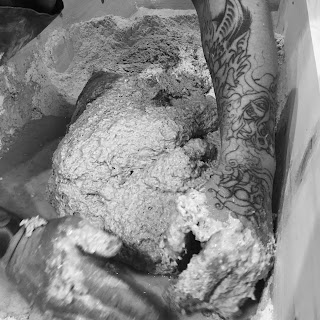伝統的な中国医学について言及しましょう。私たちは食事に注意を払うことにより心身の健康を保つことができます(医食同源)。私は、日本の伝統的な薬局は漢方薬に基づいているはずだから当然、医食同源の考え方が浸透していると思っていました。
ではなぜ私たちの周りにあるお店の棚にはこんなにたくさんの毒があるのでしょうか?
最近、雑誌をめくってみました。町のいわゆるベーカリー特集の雑誌です。私たちはついにジャンクフードの頂点に達したと思いました。残念ながら、このおしゃれなお店たちは(本来あるべき姿の)本当のパンを販売していません。ページをめくりながら、奈良で一年間耐えなければならなかった偽物のパンのひどい匂いを思い出しました。
パンとは、粉、水、空気、塩です。健康的で栄養価の高い材料を使い、それらに敬意を払いながら準備をすれば、美味しいパンが自然にできます。伝統的なパンの国フランスから来た私は、この現実に悲しくて怒っています。
もし世界中で、インスタントラーメンが日本料理の象徴になるとしたらどんな気分ですか?最近のパンにはもはや尊厳はなく、パンと呼ばれるものは改造されまくった「ゴジラパン」つまり、添加物と風味増強剤の塊ばかり。
パン作りは絶え間なく続く学習道です。日本料理の歴史を知らない人、この人を日本料理人と呼べますか?料理やパン作りとは、技術を身に着けることだけではありません(誰もが絶え間ない練習で熟練を習得します)。材料の起源や料理の歴史を知ることが必要です。20年前に日本に来て最初に学んだことは、食品の混じり気のないシンプルさ。例えば、会席料理のわびさび哲学。もしあなたがそれを理解できるならばパンの考え方も同じとわかるはずです。パン屋は物事を強制したりコントロールしたりしません。ただ4つの基本的な要素:粉、水、空気、塩、を組み合わせるのみ。あとは時間をおくだけです(私の場合15時間/冬は18時間)。私のパン屋では、コック帽や刺繍入りの上着がありません。「スタイル」も「シグネチャー」もありません。私はただみんなに健康的な食材を提供することにのみ専念しています。健康的な土壌から良い材料を提供してくれる農家の皆さんに敬意を称します。
ではなぜ私たちの周りにあるお店の棚にはこんなにたくさんの毒があるのでしょうか?
最近、雑誌をめくってみました。町のいわゆるベーカリー特集の雑誌です。私たちはついにジャンクフードの頂点に達したと思いました。残念ながら、このおしゃれなお店たちは(本来あるべき姿の)本当のパンを販売していません。ページをめくりながら、奈良で一年間耐えなければならなかった偽物のパンのひどい匂いを思い出しました。
パンとは、粉、水、空気、塩です。健康的で栄養価の高い材料を使い、それらに敬意を払いながら準備をすれば、美味しいパンが自然にできます。伝統的なパンの国フランスから来た私は、この現実に悲しくて怒っています。
もし世界中で、インスタントラーメンが日本料理の象徴になるとしたらどんな気分ですか?最近のパンにはもはや尊厳はなく、パンと呼ばれるものは改造されまくった「ゴジラパン」つまり、添加物と風味増強剤の塊ばかり。
パン作りは絶え間なく続く学習道です。日本料理の歴史を知らない人、この人を日本料理人と呼べますか?料理やパン作りとは、技術を身に着けることだけではありません(誰もが絶え間ない練習で熟練を習得します)。材料の起源や料理の歴史を知ることが必要です。20年前に日本に来て最初に学んだことは、食品の混じり気のないシンプルさ。例えば、会席料理のわびさび哲学。もしあなたがそれを理解できるならばパンの考え方も同じとわかるはずです。パン屋は物事を強制したりコントロールしたりしません。ただ4つの基本的な要素:粉、水、空気、塩、を組み合わせるのみ。あとは時間をおくだけです(私の場合15時間/冬は18時間)。私のパン屋では、コック帽や刺繍入りの上着がありません。「スタイル」も「シグネチャー」もありません。私はただみんなに健康的な食材を提供することにのみ専念しています。健康的な土壌から良い材料を提供してくれる農家の皆さんに敬意を称します。
And the medicine became poison ...
It is true that in ancient Greek 'Pharmakon' refers to both : the poison and the remedy, the beneficial and the harmful drug.
So let's base ourselves on traditional Chinese medicine. By paying particular attention to our diet, we do good for our body and mind.
Living here, I thought that, since the traditional Japanese pharmacopoeia is based on Chinese medicine, it would be an established fact, an obviousness. So why so many poisons on the shelves of our stores?
Living here, I thought that, since the traditional Japanese pharmacopoeia is based on Chinese medicine, it would be an established fact, an obviousness. So why so many poisons on the shelves of our stores?
Recently I caught myself leafing through one of these magazines dedicated to the so-called bakeries established in town. I think we've reached the pinnacle of junk food. It’s sad but not one of these famous stores sells bread. Bread is Flour, Water, Air and Salt... It works if you use healthy and nutritious ingredients, and prepare them with respect. It makes me angry and makes me sad at the same time.
Imagine if worldwide the Dragon Roll would be the emblem of Japanese cuisine ...
Unfortunately, this is the case today with bread here, ‘godzilla-bread’ stuffed with additives and flavour enhancers.
Baking is a constant learning path.
Would you consider a japanese chef, someone who doesn’t know about japanese cuisine history ? Cooking or baking is not only about being skilled (skills you aquire with endless practice). Know your ingredients, their origin, and the history that brings the dish as it is today. First thing I learned 20 years ago when I came here, was about purity and simplicity of the food. The wabisabi philosophy behind kaiseki gastronomy for example. If you do agree, then you also understand bread. It is exactly the same thing, a baker doesn’t force or control things, he just unites 4 basic elements : Flour, Water, Air and Salt. Then time does the rest : for me, 15 hours (18 hours in winter).
ここに掲載している文章と情報はステファン・エックオリジナルのものです。通常マナーとして、コピー&ペーストは控えてください。©2020 Stéphane Eck
